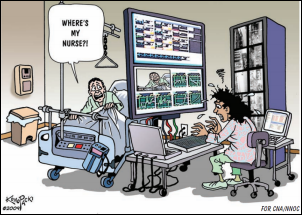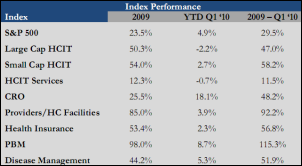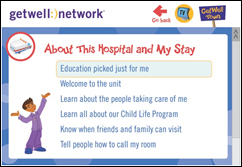Thank you for the mention, Dr. Jayne — we appreciate the callout, the kind words and learning more about the…
News 4/14/10
From Dr. Know: “Re: California Nurses Association. We have been rolling out an electronic health record system and have been confronted with growing resistance from the nursing staff, which is heavily unionized. They continue to refer to this document (warning: PDF) published by the California Nurses Association, which says, ‘Don’t Automate.’” The union’s flyer says that healthcare IT is driven by the desire of employers to control workers, that EMRs are used to spy on employees, and that technology is intended to homogenize health professionals and patients like interchangeable machine parts. I don’t disagree with all of it, but it’s pretty over-the-top.
From Minute Man: “Re: Leagcy Health. Dick Gibson MD, senior VP and CIO of Legacy Health System in Portland, OR who spearheaded the purchase of Epic, has been let go. In addition, Carol Edwards, VP of information systems with 20+ years at Legacy Health, was let go at the same time. They both left at the end of March. The Epic implementation has encountered significant costs overruns and delays. The project manager is a consultant who has no prior Epic implementation experience. Interestingly, the same consultant managed the Cerner implementation at Legacy, which is being replaced with Epic.” Unverified.
From The PACS Designer: “Re: iPad first look. If you haven’t purchased and received your iPad yet, you may enjoy the arrival experience by viewing Fritz Nelson’s iPad delivery and first use out of the packaging in his review for InformationWeek. Also, the Apple Insider has a full review of all the features available on the iPad.”
The Methodist Hospital (TX) enhances its online patient experience by launching distributed authorship of content for Web visitors from MEDSEEK.
A hospital in Thailand says it will be among the world’s best after an IT investment of $1.5 million. It will run PeopleSoft financials and HR.
Vanderbilt researchers present a paper describing the privacy method they developed that generalizes genomic data in EMRs to prevent linking patients to their genetic profiles.
I closed out the poll to your right because it was getting spammed hard by respondents (or automated scripts) choosing Eclipsys as the most innovative vendor. The polls usually get around 200 votes and this one was up to 688, with Eclipsys getting 528 of those. You can decide whether you believe that result.
Healthcare Growth Partners releases its HIT market report for Q1 (warning: PDF).
The Wall Street Journal writes up HIEs, profiling the data sharing of Children’s Denver, Kaiser’s Colorado physician group, and Exempla, all of which use Epic and share information.
A doctor and EMR consulting company vendor criticizes Canada Health Infoway’s multi-billion dollar EHR project, citing low physician adoption. Among his criticisms: the “unconscious patient in the ED” is rare and hard to justify as a necessity; investments have been focused on hospitals instead of doctors’ offices where most care is provided; EMRs don’t help with referrals or consultations, which still require paper; and privacy issues and local legislation prohibits the free flow of information that the system was built around.
Speaking of Infoway, the specially created pension plan of its CEO has accumulated $1 million in benefits after six years on the job, not bad for running an organization with only 200 employees.
It’s not just medical doctors who suffer through EMR implementations – veterinarians have similar concerns. “They really pushed big at the conferences. They knew that they were going to be bought and had to make their numbers look good. I just don’t think they were ready to take on a practice like ours.”
The mother of a nationally known activist who died at UPMC Shadyside blames the hospital’s “unreliable and insufficiently tested” computer system, saying its faulty records resulted in his being given soup too soon after surgery, leading to his asphyxiation. She also claims the hospital released his information to a congressman without permission.
If you work for a hospital or health system, please complete my three-question anonymous survey: your job title, the name of your employer, and the location. It’s nice to know who’s reading.
A primary healthcare center and ED launch what they say is the first HIE in Georgia, with the organizations sharing medical records of uninsured patients to streamline delivery and reduce duplication of services.
HERtalk by Inga
From CowCHIT: “Re: Karen Bell. She was just named Mark Leavitt’s replacement at CCHIT. Don’t know her myself, but … she can’t be any slimier than Leavitt seems.” Sounds like a glowing endorsement. She was most recently SVP of HIT services for Masspro, and before that was director of the Office of HIT Adoption and acting director of ONC. Because of her previous association with ONC, she’ll be unable to lobby for CCHIT in front of federal officials until November 2010.
e-MDs announces it has increased its employee count by 36% over the last year and experienced a 36.5% increase in organic sales since the start of 2010.
CliniComp says that three more US Army and Navy facilities deployed the Essentris EMR during the first quarter of this year.
CynergisTek launches its HIPAA/HITECH Security Compliance review solution for hospitals that qualify for SHIP grants from the Office of Rural Health Policy.
Eclipsys announces the release of Sunrise Enterprise 5.5, which the company says includes significant EHR updates. The new release includes Helios, the new Eclipsys open platform strategy that allows third parties to natively integrate their applications.
The Children’s Hospital at Montefiore (NY) will implement GetWellNetwork’s GetWellTown, the pediatric version of its Interactive Patient Care program.
Foundation Radiology Group appoints Tom Skelton CEO. Last month a reader tipped us off that Skelton was leaving MED3000, where he served as president of technology services.
HIE Health Advancement Collaborative of Central New York signs a multi-year agreement with Axolotl for its Elysium Exchange suite.
Thomas Jefferson University and Jefferson University Physicians select Allscripts and dbMotion to provide an integrated and interoperable EHR and population management solution.
Eight thousand Vancouver Coastal Health (BC) employees are now live on workforce management solutions from Kronos, including time and attendance and employee scheduling.
Catholic Health Initiatives chooses RelayHealth RevRunner for patient eligibility verification.
David Blumenthal wins his second big award in just over a month. In early March, Blumenthal won top HISsie honors as HIStalk’s Healthcare IT Industry Figure of the Year. He has now been named the Most Powerful Physician Executive in America by Modern Physician and Modern Healthcare readers. I’m sure the latter award, while not as prestigious as a HISsie, will still be coveted.
Only 7% of US residents use personal health records, but that’s up from 2.7% last year. Younger individuals with more education and higher incomes are more likely to use PHRs. I’m assuming I am just too old / uneducated and/or poor since I don’t have one. Mostly I am PHR-less because it seems like far too much work to maintain. However, just today I was thinking that it would be kind of cool if I had a PHR. I’m trying to buy health insurance and am needing to provide the evil insurance company TEN years’ worth of medical history. As in, every antibiotic for every strep throat or bronchitis attack, every outcome to every dermatologic encounter, and every little medical incident that I have either forgotten about or don’t care to share. Seriously? I have a new theory about why so many Americans are uninsured but that’s all a can of worms I don’t care to open. Suffice it to say that maybe – maybe — I’ll start looking into using a PHR.
A man sues medical device maker Stryker, claiming its artificial hip destroyed his sex life. He alleges that while having an intimate moment with his wife, the act was interrupted because the squeaking made her start laughing (how insensitive). About 750 individuals have also filed lawsuits, including a fellow who put a video of his squeaky hip on YouTube. If you check out the video, let me know if you think this guy is wearing Superman pajamas.








That looked more like a Captain American jogging outfit to me (hmm, is that showing a Marvel over DC bias?)
As for the PHRs, I’m still not convinced that number will jump significantly. Someone (I think Margalit Gur-Arie) commented over at the Health Care Blog that there’s a difference between a patient portal (access) and a PHR, which implies patient control/responsibility.
I keep seeing PHRs compared to ATMs, but that comparison doesn’t stick with me. For one thing, ATMs allowed young hipsters the freedom to buy more with less planning, which is always cool (if not wise). But managing health is not seen as cool; actually, it takes away time from being cool, unless you’re naturally fabulous like Inga. Remember, these are the same young people who aren’t buying insurance because they believe they won’t get sick or have anything bad happen to them. Managing health is not their first priority, so unlike with other technologies, the young will probably not drive consumption.
Indeed, the people who would be most helped by PHRs are often least likely to want to mange them. Example: my grandparents have learned how to play Solitaire on the computer and check email on their dialup connection. Whenever my grandfather needs to do something about his VA benefits, he asks my mother to go on the computer for him. He certainly doesn’t need/want to use a PHR. When I asked my mother, she said she’d like to see the information, but not be responsible for updating it or having to figure it all out, and she’s someone who teaches online.
So no, I don’t the PHR number is going to climb very high. I could be wrong, of course, but I think (for right or for wrong) most people want to pay their doctor and be done with it.
Hospitals and HIT companies must come clean on the adverse events facilitated by the “insuffuciently tested” systems that they are using and selling, respectively. The “blame the disgruntled doctor” who uses the user unfriendly HIT systems is a mentality serving a convenient short term fix for significant long term defects which continues to result in dangers to all patients.
.
Inga,
THe CHCF report on PHR adoption did show better than 2x growth, but that growth was over a couple of years (last such study was conducted by Markle, believe that is where the 2.7% number came from) and our own numbers (Chilmark Research) from Spring 2008 had adoption pegged at 3.3%.
Did a brief write-up on the report http://chilmarkresearch.com/2010/04/13/survey-uncovers-strong-growth-in-phr-usage/ Some of the numbers are odd – could be a west coast/Kaiser halo to report’s findings/stats. Biggest news from the report was that apparently less educated, lower income users actually derived the biggest benefit from PHR use. This could have some pretty big policy implications particularly in light of HITECH, meaningful use and possible Stage 2 requirement for providers to have a PHR for their customers.
PHR use was less than .5% in England in more than 1 million eligible patients. Patients do not want to C $CHIT promoted by a LIEber. They want a doctor to take care of them, advise them, and interpret test for them. The patient who looks at his/her own record has little idea of the significance. As for weight, they can buy a scale, which raises a good question. How many patients have PHR access but do not own a scale?
Susie and Rejuvenator – just find yourself a doc you like and pay your bills so they can afford to treat you with a wonderful, caring paper record.
And stop ripping on people who fundamentally do a pretty darned good job.
Put your names in public and take a stand – like Steve does, like John does. Make your case. Share your data. Whatever.
Just stand for something instead of just against everyone else.
Minute Man: Legacy Health
It is true that Dr Gibson and Carol Edwards are no longer with Legacy Health. It is INCORRECT that the project is “significantly over budget”. As for behind schedule: Also not true. The activation dates set over a year ago are still on track.